
The Kallikak Family
Encyclopedia
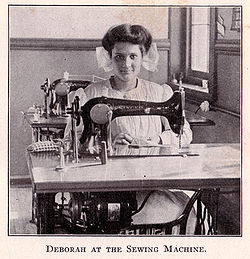
Psychology
Psychology is the study of the mind and behavior. Its immediate goal is to understand individuals and groups by both establishing general principles and researching specific cases. For many, the ultimate goal of psychology is to benefit society...
and eugenicist
Eugenics
Eugenics is the "applied science or the bio-social movement which advocates the use of practices aimed at improving the genetic composition of a population", usually referring to human populations. The origins of the concept of eugenics began with certain interpretations of Mendelian inheritance,...
Henry H. Goddard
Henry H. Goddard
Henry Herbert Goddard was a prominent American psychologist and eugenicist in the early 20th century...
. The work was an extended case study of Goddard's for the inheritance
Inheritance
Inheritance is the practice of passing on property, titles, debts, rights and obligations upon the death of an individual. It has long played an important role in human societies...
of "feeble-minded
Feeble-minded
The term feeble-minded was used from the late nineteenth century in Great Britain, Europe and the United States to refer to a specific type of "mental deficiency". At the time, mental deficiency was an umbrella term, which encompassed all degrees of educational and social deficiency...
ness," a general category referring to a variety of mental disabilities including mental retardation
Mental retardation
Mental retardation is a generalized disorder appearing before adulthood, characterized by significantly impaired cognitive functioning and deficits in two or more adaptive behaviors...
, learning disabilities, and mental illness
Mental illness
A mental disorder or mental illness is a psychological or behavioral pattern generally associated with subjective distress or disability that occurs in an individual, and which is not a part of normal development or culture. Such a disorder may consist of a combination of affective, behavioural,...
. Goddard concluded that a variety of mental traits were hereditary and society should limit reproduction by people possessing these traits.
Goddard's research and argument
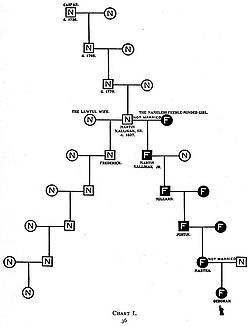
Pseudonym
A pseudonym is a name that a person assumes for a particular purpose and that differs from his or her original orthonym...
derived from the Greek καλός (kalos) and κακός (kakos), meaning "good" and "bad," respectively), a woman in Goddard's institution, the New Jersey Home for the Education and Care of Feebleminded Children (now Vineland Training School
Vineland Training School
The Vineland Training School is a non-profit organization in Vineland, New Jersey with the mission of educating the developmentally disabled so they can live independently. It has been a leader in research and testing....
). In the course of investigating her genealogy
Genealogy
Genealogy is the study of families and the tracing of their lineages and history. Genealogists use oral traditions, historical records, genetic analysis, and other records to obtain information about a family and to demonstrate kinship and pedigrees of its members...
, Goddard claims to have discovered that her family tree bore a curious and surprising moral tale.
The book follows the genealogy of Martin Kallikak, Deborah's great-great-great grandfather, a Revolutionary War hero. On his way back from battle, the normally morally upright Martin dallied one time with a "feeble-minded
Feeble-minded
The term feeble-minded was used from the late nineteenth century in Great Britain, Europe and the United States to refer to a specific type of "mental deficiency". At the time, mental deficiency was an umbrella term, which encompassed all degrees of educational and social deficiency...
" barmaid. The young Martin soon reformed and went on with his upright life, becoming a respected New England citizen and father of a large family of prosperous individuals.
But according to Goddard, a child was born by the dalliance with "the nameless feeble-minded girl". This single child, a male, went on to father more children, who fathered their own children, and on and on down the generations. And so with the Kallikaks, Goddard claims to have discovered, one has as close as one could imagine an experiment in the hereditability of intelligence, moral ability, and criminality.
On the "feeble-minded" side of the Kallikak family, descended from the barmaid, the children wound up poor, insane, delinquent, and mentally retarded. Deborah was, in Goddard's assessment, "feeble-minded": a catch-all early 20th century term to describe various forms of mental retardation or learning deficiencies. Goddard was interested in the heritability of "feeble-mindedness" — and often wrote of the invisible threat of recessive "feeble-minded" genes carried by otherwise healthy and intelligent looking members of the population (Mendel's laws
Mendelian inheritance
Mendelian inheritance is a scientific description of how hereditary characteristics are passed from parent organisms to their offspring; it underlies much of genetics...
had only been rediscovered a decade before; Goddard's genetic shorthand was, in its day, considered to be on par with cutting edge science). It was in tracing the family history of Deborah that Goddard and his assistants -- usually upper-class girls from nearby colleges -- discovered that Deborah's family of drunks and criminals was related -- through Martin Kallikak -- to another family tree of economy and prosperity.
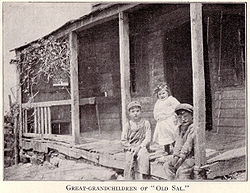
Goddard concluded from this that intelligence, sanity, and morality were hereditary, and every effort should be undertaken to keep the 'feeble-minded' from procreating, with the overall goal of potentially ending 'feeble-mindedness' and its accompanying traits. The damage from even one dalliance between a young man and a "feeble-minded" girl could create generations and generations worth of crime and poverty, with its members eventually living off the generosity of the state (and costing taxpayers a fortune), Goddard argued. His work contains intricately constructed family trees, showing near-perfect Mendelian ratios in the inheritance of negative and positive traits.
Unsurprisingly, Goddard recommended segregating them in institutions exactly like the one he himself ran, where they would be taught how to work various forms of menial labor.
Present-day evaluation of the work
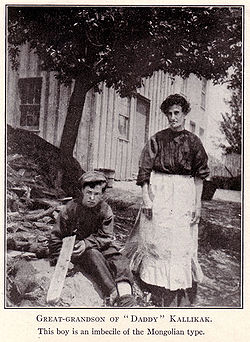
Psychology
Psychology is the study of the mind and behavior. Its immediate goal is to understand individuals and groups by both establishing general principles and researching specific cases. For many, the ultimate goal of psychology is to benefit society...
in policy, and along with the work of Charles B. Davenport and Madison Grant
Madison Grant
Madison Grant was an American lawyer, historian and physical anthropologist, known primarily for his work as a eugenicist and conservationist...
is considered one of the canonical works of early 20th century American eugenics
Eugenics
Eugenics is the "applied science or the bio-social movement which advocates the use of practices aimed at improving the genetic composition of a population", usually referring to human populations. The origins of the concept of eugenics began with certain interpretations of Mendelian inheritance,...
.
In recent years, its methodology and conclusions have been standard examples of the problems with early eugenics and heredity research. Though Goddard was considered a true scientist in his day — he was the first to bring Alfred Binet
Alfred Binet
Alfred Binet was a French psychologist who was the inventor of the first usable intelligence test, known at that time as the Binet test and today referred to as the IQ test. His principal goal was to identify students who needed special help in coping with the school curriculum...
's IQ test to the United States and to translate it into English — his work is now relegated to the same realm of pseudoscience
Pseudoscience
Pseudoscience is a claim, belief, or practice which is presented as scientific, but which does not adhere to a valid scientific method, lacks supporting evidence or plausibility, cannot be reliably tested, or otherwise lacks scientific status...
and chicanery as that of the other eugenicists of his era. The majority of Goddard's data was collected by his assistants, upper-class girls from nearby colleges, who would wander into the slums of the "bad" side of the Kallikak family, and spend only a moment before pronouncing a member "feeble-minded."
It has also been argued that the effects of malnutrition
Malnutrition
Malnutrition is the condition that results from taking an unbalanced diet in which certain nutrients are lacking, in excess , or in the wrong proportions....
were overlooked in the Kallikak family. Goddard's peer, Davenport, even identified various forms of diseases now known to be caused by diet deficiencies as being hereditary.
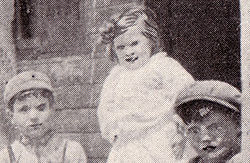
Fetal alcohol syndrome
Fetal alcohol syndrome is a pattern of mental and physical defects that can develop in a fetus in association with high levels of alcohol consumption during pregnancy. Current research also implicates other lifestyle choices made by the prospective mother...
(FASD). In addition to poverty and malnourishment, prenatal alcohol exposure can create craniofacial
Craniofacial
Craniofacial may be used to describe certain congenital malformations, injuries, surgeons who subspecialize in this area, multi-disciplinary medical-surgical teams that treat and do research on disorders affecting this region, and organizations with interest in...
and other physical anomalies that could account for their peculiar facial features. Furthermore, prenatal alcohol exposure may also damage the central nervous system
Central nervous system
The central nervous system is the part of the nervous system that integrates the information that it receives from, and coordinates the activity of, all parts of the bodies of bilaterian animals—that is, all multicellular animals except sponges and radially symmetric animals such as jellyfish...
, which can result in impaired cognitive and behavioral functioning similar to that described by Goddard.
Alteration of Photographs
The paleontologist and science writer Stephen Jay GouldStephen Jay Gould
Stephen Jay Gould was an American paleontologist, evolutionary biologist, and historian of science. He was also one of the most influential and widely read writers of popular science of his generation....
advanced the view that Goddard — or someone working with him — had retouched the photographs used in his book in order to make the "bad" Kallikaks appear more menacing. In older editions of the books, Gould said, it has become clearly evident that someone has drawn in darker, crazier looking eyes and menacing faces on the children and adults in the pictures. Gould argues that photographic reproduction in books was still then a very new art, and that audiences would not have been as keenly aware of photographic retouching, even on such a crude level. The 14 photos were subsequently studied further to show the nature of the retouching and subsequent use to help make Goddard's points
The psychologist R. E. Fancher, however, has claimed that retouching of faces of the sort which is apparent in Goddard's work was a common procedure at the time, in order to avoid a "washed out" look which was common to early photographic printing methods (poor halftones). Furthermore, Fancher argued, malicious editing on Goddard's part would take away from one of his primary claims: that only a trained eye can spot the moron in the crowd.
Influence of the study
The overall effect of The Kallikak Family was to temporarily increase funding to institutions such as Goddard's, but these were not seen to be worthwhile solutions of the problem of "feeble-mindedness" (much less "rogue" "feeble-mindedness" — the threat of idiocy as a recessive trait), and more stringent methods, such as compulsory sterilizationCompulsory sterilization
Compulsory sterilization also known as forced sterilization programs are government policies which attempt to force people to undergo surgical sterilization...
of the mentally retarded, were undertaken.
The term "Kallikak" became, along with "Jukes
The Jukes family
The Jukes family was a New York hill family studied in the late 19th and early 20th centuries. The studies are part of a series of other family studies, including the Kallikaks, the Zeros and the Nams, that were often quoted as arguments in support of eugenics, though the original Jukes study, by...
" and "Nams" (other case studies of similar natures), a cultural shorthand for the rural poor in the South and Northeast United States.
See also
- Carrie BuckCarrie BuckCarrie Buck was a plaintiff in the United States Supreme Court case, Buck v. Bell, 274 U.S. 200 , and was ordered to undergo compulsory sterilization for purportedly being "feeble-minded." The surgery was carried out while Buck was an inmate of the Virginia State Colony for Epileptics and...
- Compulsory sterilizationCompulsory sterilizationCompulsory sterilization also known as forced sterilization programs are government policies which attempt to force people to undergo surgical sterilization...
- Degeneration Theory
- EugenicsEugenicsEugenics is the "applied science or the bio-social movement which advocates the use of practices aimed at improving the genetic composition of a population", usually referring to human populations. The origins of the concept of eugenics began with certain interpretations of Mendelian inheritance,...
- Family studies in eugenics
Further reading
- Henry H. GoddardHenry H. GoddardHenry Herbert Goddard was a prominent American psychologist and eugenicist in the early 20th century...
, The Kallikak Family: A Study in the Heredity of Feeble-Mindedness, New York: Macmillan, 1912. - Stephen Jay GouldStephen Jay GouldStephen Jay Gould was an American paleontologist, evolutionary biologist, and historian of science. He was also one of the most influential and widely read writers of popular science of his generation....
, The Mismeasure of ManThe Mismeasure of ManThe Mismeasure of Man , by Stephen Jay Gould, is a history and critique of the statistical methods and cultural motivations underlying biological determinism, the belief that “the social and economic differences between human groups — primarily races, classes, and sexes — arise from inherited,...
, Norton: New York, 1996, revised edn. - R. E. Fancher, "Henry Goddard and the Kallikak family photographs," American Psychologist, 42 (1987), 585-590.
- J. David Smith, Minds Made Feeble : The Myth and Legacy of the Kallikaks, Rockville, MD : Aspen, 1985 ISBN 0-87189-093-3

